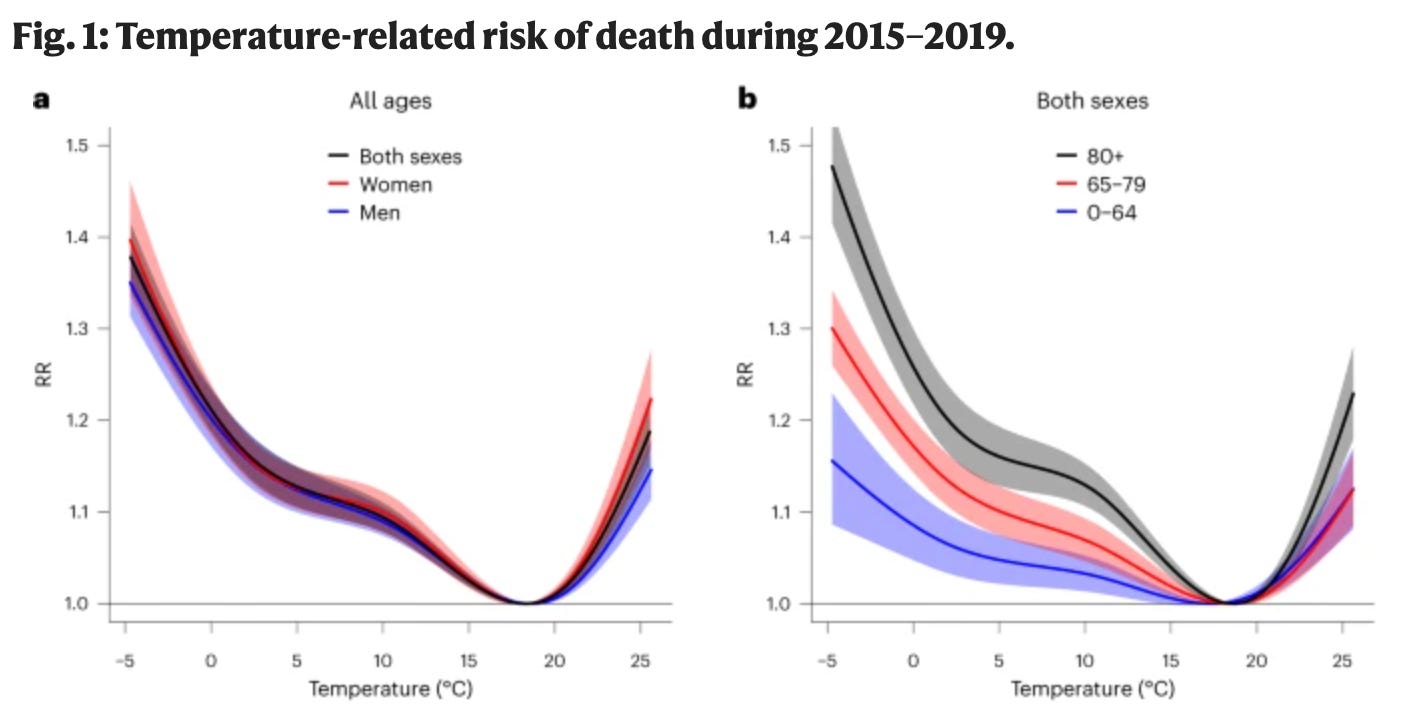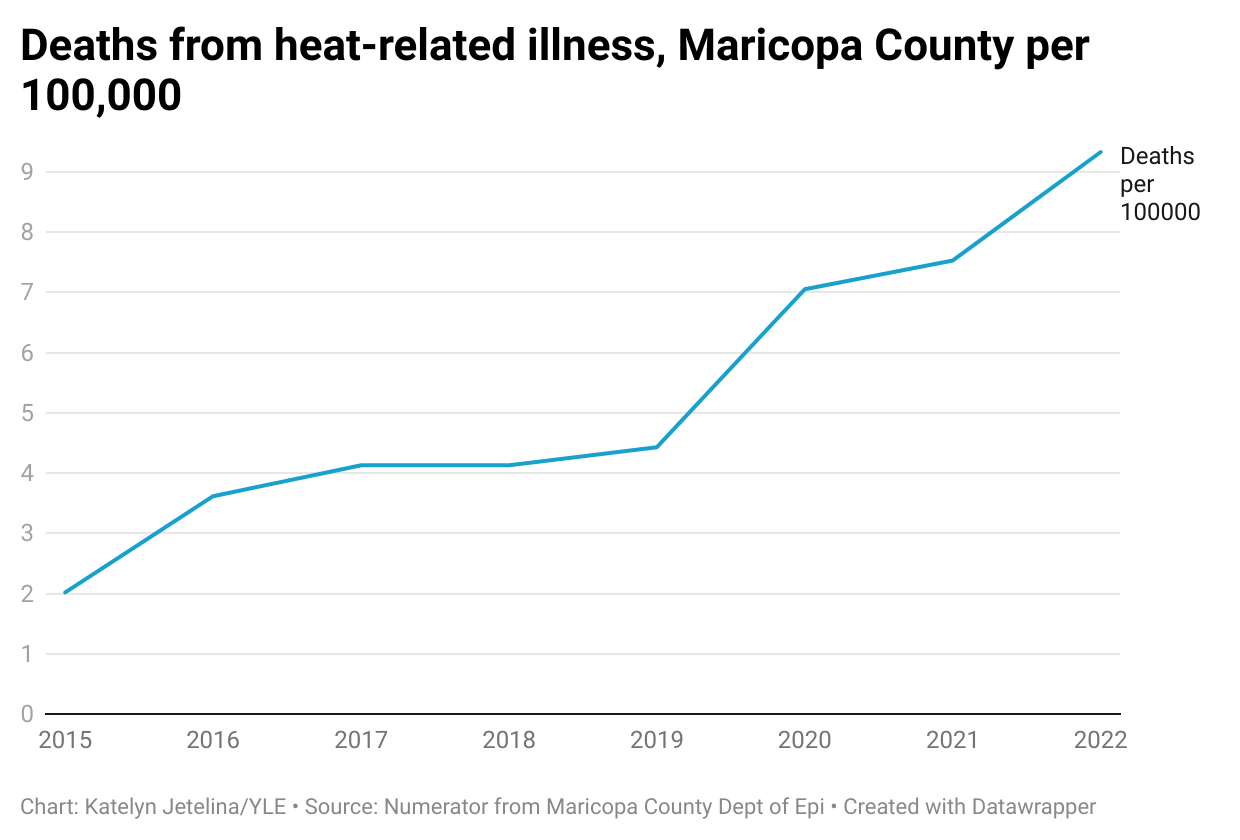Um, it’s hot out there. Heat records are breaking all across the globe this summer.
I just spent a week in Texas, and one of my girls got sick really fast. So, naturally, I went down the epi rabbit hole of curiosity: if heat records are breaking, have heat-related illnesses (HRI) increased, too? This may seem intuitive, but some factors are decreasing risk now, too.
This is what I found.
United States
Like many things in public health, the HRI surveillance is a suboptimal patchwork of data, and only some states are reporting, creating a fragmented picture. It seems to have improved over time, which is great.
Among states reporting, in 2021, Louisiana had the highest age-adjusted rate of emergency department visits for HRI (~50 per 100,000 per year). There are substantial year-to-year fluctuations, but rates have remained relatively stable from 2006-2021.
While state data is lagged (last update was 2021), data by region is impressively available in almost real-time. 2023 is shaping up to be unique in the Midwest, with higher rates of HRI than in previous years.
Before 2021, hospitalization rates were lower than ED visits (as expected) and have remained relatively stable since 2000. However, one state stands out: Arizona.
The largest county in Arizona—Maricopa County (i.e., Phoenix)—provides a beautiful annual heat-related death report. In Maricopa County, heat deaths increased fivefold since 2015.
An increase in outside deaths largely drives this pattern. And indoor deaths are mostly among those without a working AC.
International surveillance
Last year nearly 62,000 Europeans died due to HRI. Italy, Spain, and Greece had the highest heat deaths per capita. As Nature Medicine shows below, as temperatures rose (and fell) in Europe, so did the risk of death, particularly among older populations.

But, when looking at heat-related excess death, the Lancet found that the global leader is Eastern Europe and sub-Saharan Africa. (It’s important to note that cold-related excess deaths have increased the most recently, though.)
What’s explaining these patterns?
Like anything in public health, several factors are increasing and decreasing HRI:
Factors increasing risk
Heat waves. 35% of heat-related deaths are during heat waves. The frequency of heat waves is increasing over time.
Increased social vulnerability. In 2016, scientists attributed an unexpected increase in Arizona heat illness to a rise in homelessness. Since 2016, homelessness has steadily increased in Maricopa County, for example.
Power outages have increased. California had a 28% increase in blackouts from 2018 to 2019. (Unclear if these were planned for wildfires or unplanned.) Texas was the state with the second more power outages. Power outages are linked to an increase in excess deaths.
Factors decreasing risk
Better forecasting and early warning systems allow businesses, schools, and individuals to take action sooner.
Increased air conditioning. AC use has crept up in the United States but dramatically increased around the globe. And researchers found that broader use of AC saves lives but disproportionately benefits those with higher incomes.
Unknown impact
Reporting behavior. If more physicians are aware of HRI, they are more likely to categorize it as such in a patient’s chart. Over time, it will look like more HRI when, in reality, it’s a product of increased reporting. But how much this contributes to patterns we’re currently seeing is unclear.
Bottom line
A change in weather impacts population-level health. Before 2021, increases in heat-related illnesses were strikingly apparent in Arizona. But changes are becoming more apparent in other regions now. We must better adapt communities, as these illnesses and deaths are preventable.
Love, YLE
“Your Local Epidemiologist (YLE)” is written by Dr. Katelyn Jetelina, MPH Ph.D.—an epidemiologist, wife, and mom of two little girls. During the day, she is a senior scientific consultant to several organizations. At night she writes this newsletter. Her main goal is to “translate” the ever-evolving public health world so that people will be well-equipped to make evidence-based decisions. This newsletter is free, thanks to the generous support of fellow YLE community members. To support this effort, subscribe below:












I am intrigued that the main solution here is "stay in the AC more", because I don't think it's a long term sustainable solution. The energy output required and environment affects (which then can just contribute to fossil fuel use and more greenhouse gases) seems self defeating. And then when the power is out, as you've mentioned, there is a wave of heat injuries. Also, in general terms, humans need to adapt, not depend on living in an artificial environment.
One thing I noticed living as a teenager at a US military installation in the Australian desert, is that the non-local American adults lived in extreme air conditioning at work for most of their day and then when they did come outside, they couldn't deal with the heat. A lot of town didn't have AC, and neither did my school - and the American students adapted to heat after several months and then started to feel comfortable like the locals. I know there are physiological reasons for this, although I'm not an expert in that area.
I've long thought the Americans with our willingness to spend huge energy expenditures and crank the AC super cold (hello women who freeze in offices on the regular!) do ourselves a disservice because we just never adapt to outside temperatures. I have no idea how you could actually have an intervention on this, but do you think there could be merit in getting people outside MORE, dressing more appropriately, hydrating more appropriately, and importantly, designing our built structures to cool interiors WITHOUT the use of AC?
Of course, as mentioned the homeless population are the hardest hit and those with AC are currently doing better, as you've shown. But I think there are better answers than "get in the AC", including for the homeless population- better access to water, shade, clothing etc
It is worth mentioning that cold extremes kill ~10 times as many people as warm extremes both globally and in Europe. So warming, which reduces cold extremes, will result in a reduction in deaths from extreme temperatures. Apparently 500,000 fewer lives were lost in the UK from 2001 to 2019 because of milder winters.
We can protect from temperature extremes by ensuring that electricity is cheap and reliable and domestic heating and cooling are readily available. This requires economic growth and cheaper energy.